|
|
|
Sort Order |
|
|
|
Items / Page
|
|
|
|
|
|
|
| Srl | Item |
| 1 |
ID:
175158
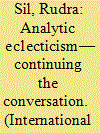

|
|
|
|
|
| Summary/Abstract |
In this response to the contributions in this symposium, I approach the above articles not as wholesale critiques requiring point-by-point rebuttal but as constructive engagements that require clarification or invite further reflection as part of an ongoing conversation. In some instances, I revisit and elaborate upon the main motivations and assumptions that Peter Katzenstein and I had in mind as we sought to lay out the significance of analytic eclecticism for different audiences. At other times, I take it upon myself to consider aspects of our approach that might be updated or reframed in light of concerns raised by some of the authors. I specifically address four issues that have been raised: the core logic of analytic eclecticism and its operationalization with respect to once-dominant paradigms in International Relations; the link between complexity, causality, and constitutive logics; the status of metatheory and the links between eclecticism and pragmatism; and the relationship between scholarly debates and “real-world” issues of policy and ethics. Whether the response is satisfactory or not, it is worth bearing in mind that, for Peter Katzenstein and myself, analytic eclecticism was always meant to be more of an ethos than a method or manifesto; that ethos long predates our published work and is evident in the thoughtful contributions that constitute this symposium.
|
|
|
|
|
|
|
|
|
|
|
|
|
|
|
|
| 2 |
ID:
161633
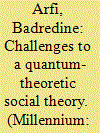

|
|
|
|
|
| Summary/Abstract |
A key claim that Alexander Wendt makes in his book Quantum Mind and Social Science: Unifying Physical and Social Ontology is that he is not using the ‘quantum’ as a metaphor. Nor is he drawing analogies either. He argues that he is constructing a quantum theory of the human subject and social structures through a quantum-theoretic explanation of consciousness undergirded by a panpsychist hypothesis of primitive proto-consciousness. In this article I show how Wendt’s insistence that he is developing a literally-speaking quantum-theoretic approach presents him with a number of must-not-ignore challenges that originate in quantum theory. I specifically discuss three challenges:
|
|
|
|
|
|
|
|
|
|
|
|
|
|
|
|
| 3 |
ID:
166894
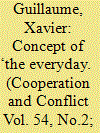

|
|
|
|
|
| Summary/Abstract |
Against the background of a continuing interest in the everyday in international relations, this article asks what kind of analytics upon and within the world mobilises one through the concept of the everyday and what consequences this may have for thinking about politics. In particular, it explores a conception of the the everyday that foregrounds the abundance of human life and ephemeral temporalities. The abundance of life invites a densification of politics combined with an emphasis on displacing levels or scales by associative horizontal relations. The ephemeral introduces a conception of temporality that foregrounds the political significance of fleeting practices and the emergent nature of life. When applied to politics, this conception of the everyday performs politics as emergent, as possibilities that are not already defined by fixing what politics can possibly be. The order of politics is then understood as an immanently precarious succession of situations and practices in which lived political lives remain inherently aleatory, momentary and emergent rather than as an order of mastering the political. The concept of the everyday, thus draws attention to the immanent elusiveness and fragility of politics as it loses its ground, its referent.
|
|
|
|
|
|
|
|
|
|
|
|
|
|
|
|
| 4 |
ID:
097817


|
|
|
| 5 |
ID:
161630
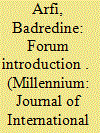

|
|
|
|
|
| Summary/Abstract |
Alexander Wendt’s Quantum Mind and Social Science: Unifying Physical and Social Ontology proposes a re-reading of many subjects and topics that have concerned IR theory over the last two decades through the quantum world and word. This book is situated quite uneasily in IR Theory: it touches upon many themes of IR theory while it understands itself to be situated beyond IR’s confines. Alexander Wendt readily admits that this book is more a treatise in social theory than ‘IR’ and he suggests that a third book will deal with ‘IR proper’.1 One could even say that this new book by Wendt is not even about a social theory of international politics as defined in his 1999 first – then groundbreaking – book. This book is about the philosophy of science and beyond … much beyond, even if the book does not always announce it as such.
|
|
|
|
|
|
|
|
|
|
|
|
|
|
|
|
| 6 |
ID:
175478
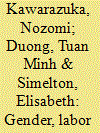

|
|
|
|
|
| Summary/Abstract |
Drawing on the narratives of women and men who have domestic or international migration experiences, this study explores the gendered impacts of migration on small-scale farming in rural Ha Tinh province in Vietnam. The paper investigates men’s and women’s migration experiences, their influence on agricultural production, and impact on their livelihoods after migration. The findings show that households use various strategies to sustain agricultural production in the absence of some members. Women’s increased economic independence through labor migration has not necessarily lead to their increased management roles in agriculture, but they are increasingly challenging stereotypical images of rural women. While migration can be a catalyst for men to transform their livelihoods, it can also widen gaps in social and economic statuses among men.
|
|
|
|
|
|
|
|
|
|
|
|
|
|
|
|
| 7 |
ID:
124908
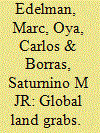

|
|
|
|
|
| Publication |
2013.
|
| Summary/Abstract |
Scholars, practitioners and activists generally agree that investor interest in land has climbed sharply, although they differ about what to call this phenomenon and how to analyse it. This introduction discusses several contested definitional, conceptual, methodological and political issues in the land grab debate. The initial 'making sense' period drew sweeping conclusions from large databases, rapid-appraisal fieldwork and local case studies. Today research examines financialisation of land, 'water grabbing', 'green grabbing' and grabbing for industrial and urbanisation projects, and a substantial literature challenges key assumptions of the early discussion (the emphasis on foreign actors in Africa and on food and biofuels production, the claim that local populations are inevitably displaced or negatively affected). The authors in this collection, representing a diversity of approaches and backgrounds, argue the need to move beyond the basic questions of the 'making sense' period of the debate and share a common commitment to connecting analyses of contemporary land grabbing to its historical antecedents and legal contexts and to longstanding agrarian political economy questions concerning forms of dispossession and accumulation, the role of labour and the impediments to the development of capitalism in agriculture. They call for more rigorous grounding of claims about impacts, for scrutiny of failed projects and for (re)examination of the longue durée, social differentiation, the agency of contending social classes and forms of grassroots resistance as key elements shaping agrarian outcomes.
|
|
|
|
|
|
|
|
|
|
|
|
|
|
|
|
| 8 |
ID:
153890


|
|
|
| 9 |
ID:
124447


|
|
|
|
|
| Publication |
2013.
|
| Summary/Abstract |
This article explores some basic issues which arise from International Relations (IR) theory also being a form of social theory in a broader sense. Many of these issues are related to the question of a "social whole," that is, whether international relations/International Relations is one of many parts of a social whole, on what grounds it is differentiated from other parts, and whether it operates on a distinct level of social reality. We argue that these questions have been addressed in many forms of IR theory, but mostly only implicitly, and that the failure to make explicit assumptions about a social whole is probably due to the relative neglect of the subject in modern Sociology. The article argues that implicit assumptions about a social whole can be unearthed by looking at the concepts of systems, levels, and sectors, discussing debates about each of these in turn. Openly addressing IR theory as social theory, and spelling out images of a social whole, allows one to gain a sharper understanding of some of the basic analytical categories used, and to judge whether they form plausible delimitations of social reality within a wider social context.
|
|
|
|
|
|
|
|
|
|
|
|
|
|
|
|
| 10 |
ID:
046640
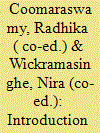

|
|
|
|
|
| Publication |
DelhI, Konark Publishers Pvt Ltd., 1994.
|
| Description |
v, 147p.
|
|
|
|
|
|
|
|
|
|
|
|
Copies: C:1/I:0,R:0,Q:0
Circulation
| Accession# | | | | | | | | | | | |
| 045861 | 302.15/COO 045861 | Main | On Shelf | General | | | | | | | |
|
|
|
|
| 11 |
ID:
117841
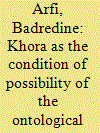

|
|
|
| 12 |
ID:
180010
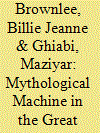

|
|
|
|
|
| Summary/Abstract |
The article revisits ‘sectarianism’ as an epistemic venue within the context of a Great Civil War in the Middle East (2001-2021), a label that includes the overarching narratives of political life in the aftermath of 9/11 up to the aftermath of the so-called ‘Arab Spring.’ By introducing the notion of the ‘mythological machine,’ it argues that ‘sectarianism’ is a myth, something that does not exist in real terms, but which has real world effects. The mythological machine is a device that produces epiphanies and myths; it is a gnoseological process, which has cultural, social and political effects through the generation of mythological facts and, as a machine, it does so through both guiding and automatized mechanisms. Through this interpretive shift, the article proceeds through several theoretical steps using a variety of cases from across West Asia and North Africa, contextualizing them within global political events. Firstly, the article argues that it is ‘civil war,’ shaped by the work of the mythological machine that governs state-society relations and transnational politics in the Middle East. Then, the article discusses how the mythological machine incorporates a semantic othering via mythological thinking, speak and practice that shapes the perception and experience of civil wars. To conclude, the article discusses how the mythological machine displaces people’s status in the context of civil wars leading to the emergence of new forms of belonging and nation-making. Ultimately, the mythological machine creates what Giorgio Agamben defines as a state without people, a condition exhausting the value of citizenship and the political.
|
|
|
|
|
|
|
|
|
|
|
|
|
|
|
|
| 13 |
ID:
120468
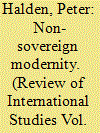

|
|
|
|
|
| Publication |
2013.
|
| Summary/Abstract |
Social theory almost invariably equates modernity with the sovereign state. This equation must be nuanced because the modern era and modern strategies of international stability have contained non-sovereign units. In the nineteenth century, the Great Powers tried to create international stability by engineering forms of rule in Europe. These strategies built on distinctively modern ideas: the possibility of radically breaking with the past, redesigning political organisations, and actively controlling political events through rational planning. Throughout the century the Great Powers alternated between creating non-sovereign units and creating sovereign units as instruments in these stabilising strategies. The degree of trust between the Great Powers accounts for the shift between the two strategies: they tended to create non-sovereign units when mutual trust was high and sovereign ones when trust was low. This article analyses Great Power strategies of designing forms of rule in the Balkans between 1820 and 1878. Like in previous centuries, nineteenth-century Europe actually consisted of two parallel but connected systems: the egalitarian system of sovereign states and a system of non-sovereign entities. Non-sovereign units disappeared only late in the century and this process was affected by the increasing rivalry and mistrust between the sovereign states.
|
|
|
|
|
|
|
|
|
|
|
|
|
|
|
|
| 14 |
ID:
144295
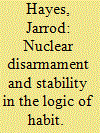

|
|
|
|
|
| Summary/Abstract |
In 2008, the announcement of the Global Zero campaign—an international effort to eliminate nuclear weapons—coincided with the election of Barack Obama. The new president, avowedly pro-disarmament, made getting to zero nuclear weapons a centerpiece of his foreign policy. This article takes on the question of what impact global disarmament might have on international strategic stability. In a break with much of the literature and analysis on nuclear policy, it explicitly focuses on how publics understand the significance of nuclear weapons. In so doing, the article draws on recent international relations scholarship on the role of habit to argue that eliminating nuclear weapons can generate instability by creating widespread perceptions of insecurity and anxiety. If disarmament campaigners wish to achieve their goal without generating instability, they will need to work over the long-term to break habituated beliefs about nuclear weapons.
|
|
|
|
|
|
|
|
|
|
|
|
|
|
|
|
| 15 |
ID:
142539
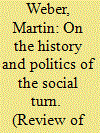

|
|
|
|
|
| Summary/Abstract |
The emergence of social theory is closely linked to the transformations inaugurated by the rise of a distinctly capitalist modernity from the second half of the eighteenth century onwards. In this article, I reconstruct the outlines of two strands of social theorising that emerged in response to the radical challenges posed by ‘the great transformation’ on the one hand, and the French Revolution on the other. I juxtapose two responses to the transnational constellations these events signify, one heralded by Auguste Comte, and the other, inter alia, by Karl Marx. While the Comtean frame obliterates meaningful registers of thinking about political transformation, I argue that conflict-theoretic tradition indebted to G. W. F. Hegel and Marx is much more amenable to analytical and practical concerns with responding politically to the challenges posed by ‘the rise of the social’. In the final part, this is discussed with reference to the ‘social turn’ in IR theory.
|
|
|
|
|
|
|
|
|
|
|
|
|
|
|
|
| 16 |
ID:
120474
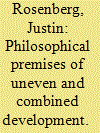

|
|
|
|
|
| Publication |
2013.
|
| Summary/Abstract |
Recent debates over Leon Trotsky's idea of 'uneven and combined development' (U&CD) have focused on its potential in the field of International Relations, but they have not established the source of this potential. Does it derive from the philosophical premises of dialectics? The present article argues that the idea of U&CD in fact involves an innovation as fundamental for Marxist dialectics as for other branches of social theory. And it also argues that in formulating this innovation, Trotsky provided a general solution to some of the most basic problems in social and international thought. The argument is set out in three parts. The first part reconstructs Trotsky's own account of dialectical premises and their implications for social explanation. The second shows how the concept of U&CD departs from this, in ways that presuppose the tacit addition of a further ontological premise. Finally, part three analyses the locus classicus of the concept - the opening chapter of Trotsky's History of the Russian Revolution - showing how it is this additional premise which underpins the central achievement of the idea: its incorporation of 'the international' into a theory of history.
|
|
|
|
|
|
|
|
|
|
|
|
|
|
|
|
| 17 |
ID:
048184
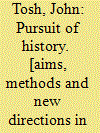

|
|
|
|
|
| Edition |
3rd ed.
|
| Publication |
Harlow, Longman, 1999.
|
| Description |
x, 228p.Pbk
|
| Standard Number |
0582304717
|
|
|
|
|
|
|
|
|
|
|
|
Copies: C:1/I:0,R:0,Q:0
Circulation
| Accession# | | | | | | | | | | | |
| 042790 | 930/TOS 042790 | Main | On Shelf | General | | | | | | | |
|
|
|
|
| 18 |
ID:
101521
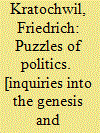

|
|
|
|
|
| Publication |
London, Routledge, 2011.
|
| Description |
xiv, 288p.
|
| Standard Number |
9780415581011, hbk
|
|
|
|
|
|
|
|
|
|
|
|
Copies: C:1/I:0,R:0,Q:0
Circulation
| Accession# | | | | | | | | | | | |
| 055573 | 327.1/KRA 055573 | Main | On Shelf | General | | | | | | | |
|
|
|
|
| 19 |
ID:
030195
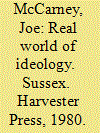

|
|
|
|
|
| Publication |
Sussex, Harvester Press, 1980.
|
| Description |
160p.hbk
|
| Series |
Harvester Philosphy Now
|
| Standard Number |
0391017047
|
|
|
|
|
|
|
|
|
|
|
|
Copies: C:1/I:0,R:0,Q:0
Circulation
| Accession# | | | | | | | | | | | |
| 020928 | 145/MCC 020928 | Main | On Shelf | General | | | | | | | |
|
|
|
|
| 20 |
ID:
133016


|
|
|
|
|
| Publication |
2014.
|
| Summary/Abstract |
This article contributes to current debates and discussions in critical social theory about diversity, inclusion/exclusion, power, and social justice by exploring intersectionality as an important theoretical resource to further develop and advance care ethics. Using intersectionality as a critical reference point, the investigation highlights two key shortcomings of care ethics which stem from this ethics' prioritization of gender and gendered power relations: inadequate conceptualizations of diversity and power. The article draws on concrete examples related to migrant domestic work to illustrate how an intersectionality lens can advance new theoretical insights for understanding caring practices (or lack of them), and generate new methodological and practical strategies for confronting and transforming the deeply entrenched interlocking power inequities that undermine the realization of care in an increasingly complex context of national and international policy and politics.
|
|
|
|
|
|
|
|
|
|
|
|
|
|
|
|
|
|
|
|
|